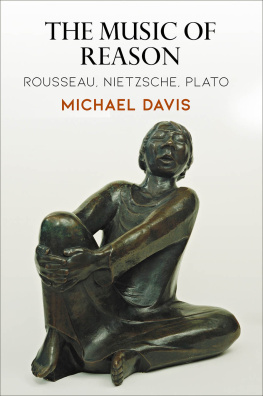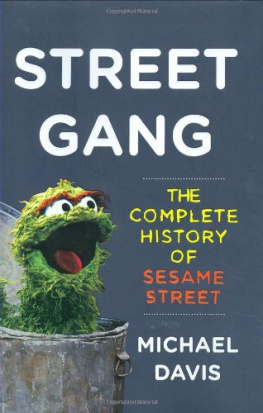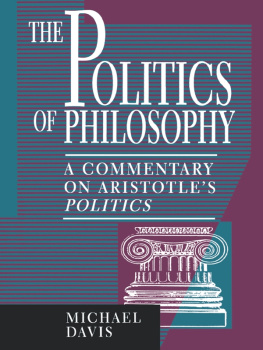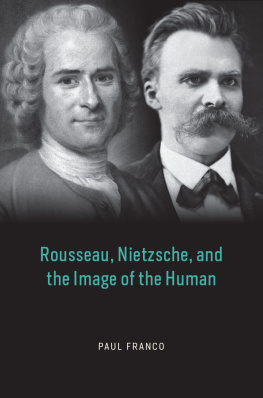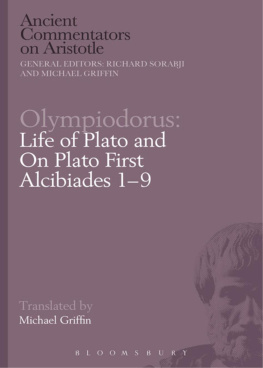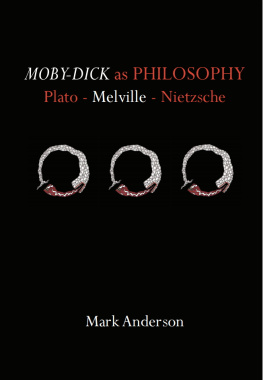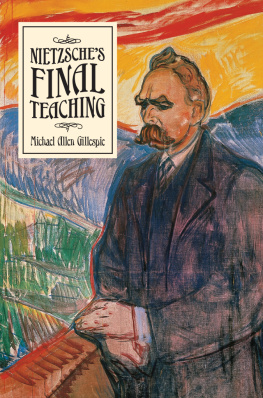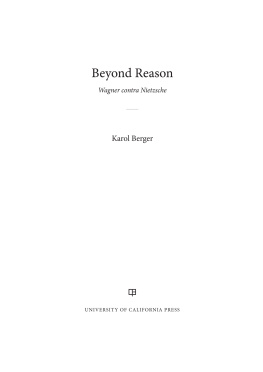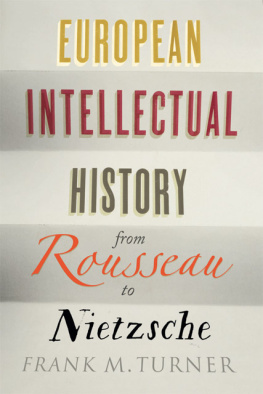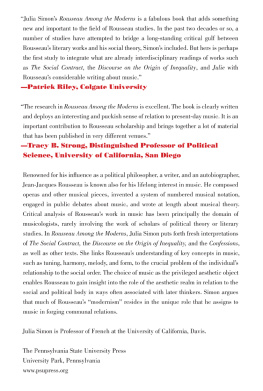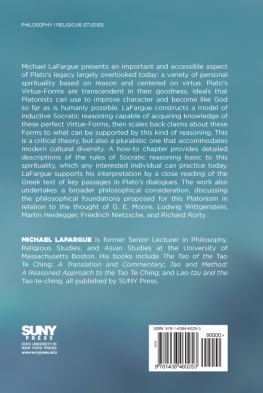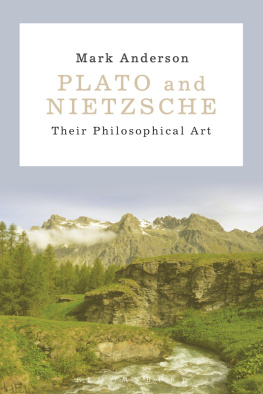HANEY FOUNDATION SERIES
A volume in the Haney Foundation Series, established in 1961
with the generous support of Dr. John Louis Haney
Copyright 2020 University of Pennsylvania Press
All rights reserved. Except for brief quotations used for
purposes of review or scholarly citation, none of this book
may be reproduced in any form by any means without written
permission from the publisher.
Published by
University of Pennsylvania Press
Philadelphia, Pennsylvania 19104-4112
www.upenn.edu/pennpress
Printed in the United States of America on acid-free paper
1 3 5 7 9 10 8 6 4 2
Library of Congress Cataloging-in-Publication Data
Names: Davis, Michael, 1947 author.
Title: The music of reason : Rousseau, Nietzsche, Plato / Michael Davis.
Other titles: Haney Foundation series.
Description: 1st edition. | Philadelphia : University of Pennsylvania Press, [2020] | Series: Haney Foundation series | Includes bibliographical references and index.
Identifiers: LCCN 2019019318 | ISBN 9780812251715 (hardcover)
Subjects: LCSH: Plato. Hippias minor. | Rousseau, Jean-Jacques, 17121778. Essai sur lorigine des langues. | Nietzsche, Friedrich Wilhelm, 18441900. Geburt der Tragdie. | Reasoning (Psychology) | Thought and thinking. | MusicPsychological aspects. | Music and language. | Language and logic.
Classification: LCC BF442 .D37 2020 | DDC 128/.33dc23
LC record available at https://lccn.loc.gov/2019019318

A string made taut and plucked gives us a sound. The same string with the same tautness, its length now halved by pressing it to the board beneath it, when plucked gives us the same sound but higher. Ever since the Pythagoreans, with considerable reason, this has been understood to be the foundation of the science of music. There is no denying the harmony of music and mathematics. Yet its very ground is puzzling. Once the octave is recognized as a phenomenon, we develop elaborate understandings of it. But what of this original recognitionthe sameness of these notes that underlies their difference? And what exactly are we doing when we apply words like higher, lower, and deeper to this difference in sound? By measuring lengths (even with length, measuring requires that we treat continuous phenomena as made up of discrete partsas mathematizable), we are able to reproduce the notes bookending our octaves. Our success seduces us into understanding what we have done by way of the language of linear measurement, a language that does not really reflect how we are able to recognize that two sounds are the same, and yet differentone higher than the other. Our puzzle is simple: What does it mean for a sound to be high? Do we look down at one sound and up at the other? Nonetheless, however obscure this initial ground, there is no denying the mathematical character of music. The reason of music is safe.
What of the music of reason? Why should it be an issue for us? In Greek, mousik is the art or science of the Muses, and in addition to what we call music, includes epic, lyric, and dramatic poetry; history; dance; and astronomy. In the first line of the Odyssey, Homer asks the Muse to tell him of the man of many ways. In the first line of the Iliad, he appeals to an unnamed goddess to sing of the wrath of Achilles. Apparently, the Accordingly, for Hesiod it is not clear whether there can be any logos that is simply true. If the lies of logos are the truths of song, does this mean that insofar as reason (logos) is truth-telling, it is musical? Often when we sing, without knowing where we are going, we know where we are going.
There seems to be a powerful adversary to such a view. In Book 10 of the Republic, Platos Socrates speaks of an ancient quarrel or difference (diaphora) between philosophy and poetry and grounds it in this very issue; their difference consists in their different relations to the truth.to see) in order to know what to imitate, signaling that by a combination of habit and unconscious longing, what was first meant to be a tool of analysis (an eidos) has been turned into a being in its own right (an idea). Behind our own backs, out of a longing we do not even acknowledge, we all make types of the true reality. This is inevitable, and so Socrates own critique of poetry of necessity exemplifies what he is criticizing, the idealizing at the heart of all logos.
Poets are what their names suggest, makers, whose work is at a remove of three from the truth. The altogether conventional movement from eidos to idea is a movement into the cave disguised as a movement out of the cave.
Socrates uses as an example of the danger of poetry the man in mourning for his son who wails in private but not in public. His suppression of grief is the kalon, the beautiful or noble, acting to overrule his connection to the real. Like a table or a fork, it enables him to put a natural feeling at a distance. This is somehow what it means to be human. Still, that grief is felt at all is a sign that the project of Books 13 of the Republic, education to the kalon, is never completely successful. We all distinguish between what we do in public But it also reveals to us our inner selves and so brings out what morality, engendered by poetry, has been at great pains to suppress. Given what it is, poetry cannot help idealizing this, too. It shows us Achilles weeping and makes us admire him for it. This is simply a version of what we all do when, for example, we rehearse to ourselves perceived slights and injustices to ourselves. Repeatedly going over them in our minds, we generate dramas with ourselves starring as victims. This process gradually pushes us further and further from reality as we polish ourselves up as heroes of our personal tragedies. Losing ourselves in this way is particularly dangerous, for it leads us to think we are no longer under the influence of conventional behavior when in fact we are becoming progressively more conventional with each celebration of the injury to ourselves. Socrates is not simply serious about being able to dispense with poetry; on the other hand, he is deadly serious about the way it tends to displace reality in the name of the kalon.
In the end then, what are we to make of the ancient difference between philosophy and poetry? What differentiates Plato from Hesiod? Poetry tells lies so powerful that we believe them to be true. But can philosophy dispense with such lies? Platos Socrates critique of poetry is itself poetic, filled with simile, metaphor, and at its core, the rhetorical slide from eidos





